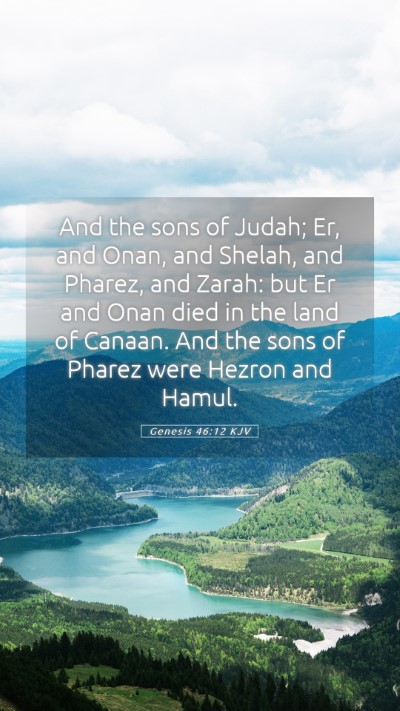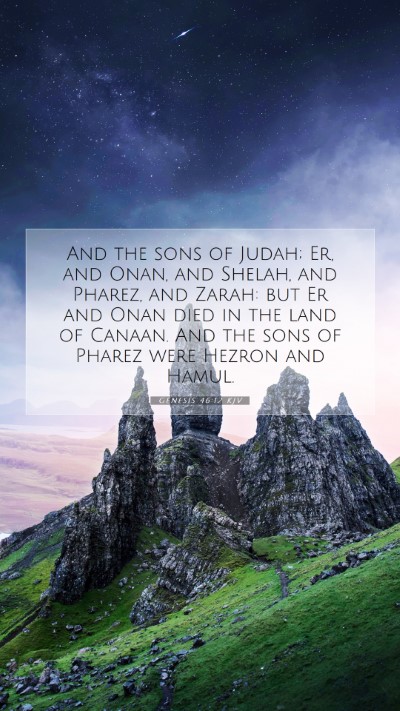Bible Verse Explanation: Genesis 46:12
Genesis 46:12 reads: "The sons of Judah: Er, and Onan, and Shelah, and Pharez, and Zerah: but Er and Onan died in the land of Canaan. And the sons of Pharez were Hezron and Hamul." This verse provides a genealogical record that plays a significant part in the history of Israel, encapsulating themes of lineage, loss, and God's providence.
Understanding Genesis 46:12
This verse is significant within the broader context of Jacob's migration to Egypt, where it marks a pivotal moment in the biblical narrative. Here is a summary of insights derived from various public domain commentaries:
Insights from Commentaries
- Matthew Henry:
Henry emphasizes the importance of genealogy in the narrative of Israel, noting that the dying of Er and Onan is a reminder of the consequences of sin. He connects their deaths to the earlier stories of their wickedness and God's judgment, showcasing the significance of living righteously.
- Albert Barnes:
Barnes highlights the historical context of the names listed, explaining that they carry deep significance for the Jewish people. The mention of Er and Onan serves as a cautionary tale about disobedience to God's commands, reinforcing broader biblical themes regarding sin and divine justice.
- Adam Clarke:
Clarke adds to the understanding by discussing the implications of familial lineage. He points out that Pharez, one of the sons mentioned, is integral to the genealogy leading to David and eventually to Jesus Christ, thus showing how this verse foreshadows God’s unfolding plan through generations.
Thematic Analysis
In analyzing Genesis 46:12, several key themes emerge:
- Lineage and Identity: The verse details the family lines of Judah, highlighting the importance of lineage in the understanding of biblical narratives.
- Divine Justice: The deaths of Er and Onan serve as a stark reminder of the gravity of sin and the reality of divine judgment, encouraging readers to reflect on their own lives and conduct.
- Covenantal Promise: The continuation of Judah's line through Pharez reinforces the idea of God's covenantal promises, which extend through failure and faith alike.
Application to Daily Life
The teachings of Genesis 46:12 can be applied to our lives in several ways:
- Living Righteously: Just as the consequences of sin are highlighted through Er and Onan, believers are encouraged to strive for holiness in their own lives.
- Understanding Legacy: The importance of family and the legacies we leave behind serve as reminders for intentional living. Each generation affects the next, and it is vital to reflect on what kind of legacy is being built.
- Trusting in God's Plan: Just as the lineage led to significant biblical figures, believers can trust that their lives play a role within God’s broader story.
Cross References
This verse relates to several other passages in the Bible that provide depth and understanding to its meaning:
- Genesis 38:6-10: This passage narrates the story of Judah’s sons Er and Onan, which sets up the understanding of their subsequent deaths.
- Ruth 4:18-22: This passage provides a broader genealogy that includes Pharez and emphasizes his descendants leading to King David.
- Matthew 1:3: The genealogy of Jesus includes Pharez, showing the importance of this lineage in the New Testament context.
Final Thoughts
The analysis of Genesis 46:12 provides deep insight not just into the history of Israel, but also into the moral and theological lessons conveyed through Scripture. Understanding this verse encourages believers to reflect on their lives, the importance of lineage, and the ever-relevant theme of God's justice and mercy.


